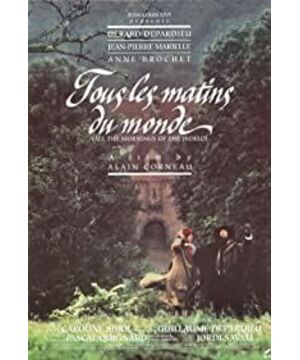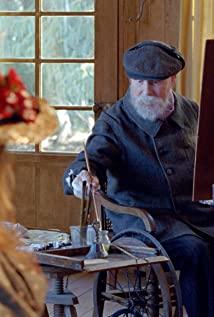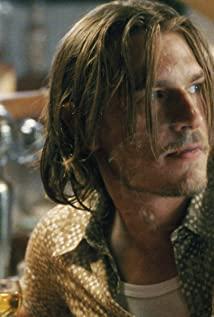The 18th-century French court, gorgeous costumes, noisy performances, rude officials, and a rough face full of old tears, he moaned and told them to stop, then he picked up Viol, and slowly sounded a song of deep sorrow. "Tombeau Les Regrets" (Note 1), tears rolled. . .
Time suddenly returned to the French countryside in the 17th century. Colombe has been immersed in the pain of bereavement of his wife. The phantom of his wife is his only support for survival. He no longer performs publicly, but hides in a rural hut. Mirage, created the peerless "Le Tombeau des Regrets". The young Marin came to Colombe's house, and wanted to worship the latter as his teacher in order to enter the court to play. He played a piece. Colombe refused his request after listening: "Vous faites de la musique. Mais vous n'êtes pas un musician (note 2)."
At the request of his daughters, Colombe allowed him to play another piece of his composition-"La rêveuse" (note 3) for his young lover Colombe’s daughter Madeleine. Colombe moved a little bit and asked him to come back in a month. When he came again, Colombe finally agreed to accept him as his apprentice, but Colome also told him that he accepted him as an apprentice not because his performance touched him, but because of the sadness in his eyes.
Their mentorship was broken after Marin performed for the court again. Colombe drove Marin out of the house frantically. At this time, Madeleine was deeply infatuated with Marin. She secretly taught Marin the skills she learned from her father. And with him eavesdropping on his father's creation and performance, making Marin step by step to the highest position of the court band.
For fame and fortune, Marin betrayed his teacher and abandoned the woman who had endured the humiliation for him. In the luxurious and comfortable court life, the tragic memories of the teenager faded away. However, it just went away, but it didn't disappear. When he saw Madeleine, who was so haggard, his dying wish was to listen to him play "La rêveuse" again, and everything came back. He didn’t sleep at night, he regretted it, he was extremely empty, and his only comfort was to come to the wooden house where the teacher was overhearing the performance of the teacher. In the harsh winter wind, with the stars and moon every night, as in "La rêveuse" Before he died, Madeleine, he just wanted to hear his teacher play "Le Tombeau des Regrets" again, because he finally understood the deep pain.
On the 23rd night of the waiting, he will never forget it. The soon-to-be-dead teacher heard him outside the house and asked him to come in. With tears, he begged the teacher to teach him the last lesson. The teacher gently held his hand and said to him softly for the first time: "Sir, if possible, please allow me to teach you the first lesson. Sir, Music is to express our unspeakable emotions."
So, the two masters and disciples looked at each other and laughed with tears. For the first and last time, they performed "Le Tombeau des Regrets".
Only when I light a clear lamp and recall those plots over and over in the dark night, I slowly understand the reason for the movie's name. Tous les matins du monde sont sans retour, this sentence in the novel is the source of the title, and all the mornings in the world are gone forever. The old man has gone and never returned, and the sorrow will never return. Fame and fortune are more like passing away. What is eternity? Is it music? Or is it hidden deep in the soul, a constant call to eternal life?
Note 1: "Le Tombeau des Regrets", which runs through the entire play, is translated as "The Tomb of Sorrow" in the film, but it is actually "The Tomb of Regrets". Colombe has always regretted it. At the moment his beloved wife passed away, Not able to accompany her in front of her bed. When Marin played many years later, he also carried similar regrets and regrets. Of course, there was a sad element in it, but it was simply the tomb of sorrow, which was too irresponsible.
Note 2: Vous faites de la musique. Mais vous n'êtes pas un musician. Colombe told Marin who just wants to be famous, you can play music, but you are not a real musician. I don't even remember what ghosts turned into the movie, because it has deviated from the original meaning because of over-beautification, it is a failed translation.
Note 3: "La rêveuse", a song composed by Marin for his young lover, was translated into "Girl in Dream" in the movie, which has a good plot, but I reserve my opinion.
View more about Tous les matins du monde reviews











